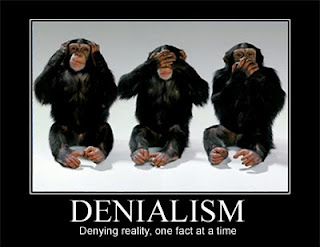What is denialism? It is defined as "the practice of creating the illusion of debate when there is none." A better way to say it is- when someone tries to argue against something that is supported by facts and/or other evidence. This train of thinking can hinder any debate over any topic. It is kind of like a disease...
You may think that the comparison of denialism to a disease is a little harsh, especially since we all are capable of falling victim to it. I know I've given in to denialism at some point. For example, I am a Miami Dolphin's fan (and I can hear all you football minded people reading this and chuckling- don't judge). So what if I yell at the referee sometimes when I think he is throwing too many yellow flags against my team? Most sports fans are guilty of this. But it is harmless, right?

Wrong. Well, it can be harmless when applied to sports, but what about bigger issues? What happens when someone has such a firm belief in one side of an argument that no scientific fact will ever sway them? It can turn dangerous. Global warming, evolution, AIDS, tobacco causing cancer- these are all big issues in which denialism can take root. What if you grew up in a house with parents who told you tobacco had no negative effects? What if, because of this, they were both chain smokers? What if they got lung cancer? This is simple correlation and causation. However, if you were a denialist, nothing that you just read would matter. If you truly believed that tobacco could not cause cancer, then not even the most well founded evidence would convince you that you are wrong. This is what makes denialism dangerous.
Not only do denialists discredit evidence, they will fight back. Here's how...
- Conspiracy- this is when a person will suggest that the known evidence came from scientists or politicians with ulterior motives.
- Selectivity- when denialists will use facts from the other side that have since been discredited. Denialists will find a flaw in the opposing argument and blow it out of proportion.
- Using another "expert"- an expert (most likely a doctor of another field) will join in and say that opposing data is flawed and lacking substantial proof or significance
- High expectations- denialists often dare others to provide absolute proof that would be, in a word, undeniable
Want to read more about denialism? Check out denialism.com.
No comments:
Post a Comment